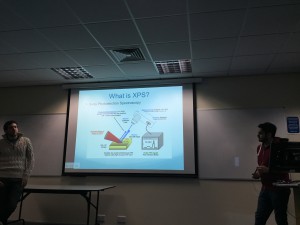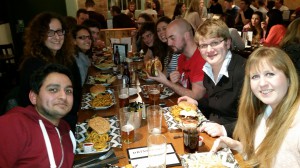February 12, 2015, by paxsk3
An Insider’s Guide to the Life Academic
The American comedian Lois C.K. in his act described the pursuit of undertaking a doctorate of philosophy as ‘not particularly impressive, as you basically just study one thing for three years’. What he doesn’t elaborate on though is just exactly how much breadth, adventure and variety there is to studying ‘just one thing’. Last week, my colleague Naim from the CDT stream highlighted the pros and cons of the newly developed project rotation style PhD. I am now going to attempt to extol the virtues of the more traditional approach.
Application
“If it doesn’t interest you and it isn’t fun, don’t do it” Richard Branson
After the usual ‘I only have two months left of my masters’ panic and realising I needed to have at least some idea of what I wanted to do next, it became clear that the majority of successful people in science (not limited to research, also in consultancy and patent law) had a PhD. After my MSc in nanoscience, which I had greatly enjoyed, I was offered my current project by one of the course coordinators which gave me the opportunity to immediately use the skills that I had acquired over that year. On this particular occasion the ideal project had been dropped into my lap. This rarely happens but if it does, you have to take it as it is so infrequently occurs. Like most people I had applied for many projects and been knocked back as my skill set didn’t match, but it was through my applications that I was given that chance, so I guess the point is just apply, you never know where it may lead.
Actually Doing a PhD
“Happiness is not the absence of problems; it’s the ability to deal with them.” Steve Maraboli
The PhD experience is hard to define, everyone’s is different. There is no typical day as a researcher, some days you will come in, run a quick experiment or two and obtain sufficient data for half a thesis chapter. Others you will desperately try to fit in two hours of lab work around meetings, demonstrating and blog writing for an experiment that hasn’t worked for half a year! What is guaranteed though is you will have many opportunities to present and explain your work. Most research groups have group meetings where the students will present their data.
These presentations can appear quite daunting, especially if you are nervous about public speaking but they are meant to be educational, it provides an opportunity to show what you have learned and what you have done. The feedback you receive from questions can be good practice for the types of things you may be asked in your final viva examination.
A bonus of doing science is, not only do we get to use equipment we are experienced in but also try out shiny new, vastly expensive bits of kit that we’d only heard about in lectures and workshops and assumed they were more myth than reality.
The Supervisors
An inspiring part of doing research at this level is that the people who will help guide you through your project will be world leaders and experts in the field. This means that they can help you to focus your work in the right direction and achieve the necessary goals in the required time. Their feedback is firm but fair and it can be quite disconcerting to show them your work, but like the group meetings, their feedback will improve your work. Also, they aren’t necessarily certain of the direction your project will take so it is invaluable to have their input, and also reassuring that they don’t always have all the answers. The experience they have can ensure that if you’re stuck they will at least point you the right way.
When choosing a PhD, finding a supervisor who fits your personality and understands you is particularly important to your progress and well-being so make sure you get to know the supervisor who will be looking after you well so you can ensure your experience is as un-stressful as possible.
Life Outside the Lab
“There is virtue in work and there is virtue in rest. Use both and overlook neither.” Alan Cohen
Believe it or not, a social life does exist during a PhD, well, up until the final few months of panic thesis writing. Doing a PhD is actually rather like doing a degree, just substituting lecture time for experimentation and analysing, so the hours aren’t ridiculous if you get the work done. Even though researching can be quite isolating and lonely at times you meet many students in your group in exactly the same boat, so you always have friends to help you and also to hang out with outside of work.
The university also has so many clubs and societies to join that it makes sense to at least sometimes take advantage of what is on offer. I’ve done debating, student radio, had free burgers and pizza, played tennis, pool and football and gone to concerts and gigs free all as part of what the Student’ Union has to offer. So even when you’re bogged down with analysis, there is always something to look forward to.
The Future
Whether you go on to further research or leave academia well behind after your studies, you can be sure that the experiences you have and the work you will achieve will help shape you and will open doors in your career. Ensure you make the most of it!
About the Blogger
Stephen Kenny is a third year PhD Student based in Boots Science Building. After completing a degree in biochemistry he moved into the field of nanoscience and never looked back.
No comments yet, fill out a comment to be the first



Leave a Reply